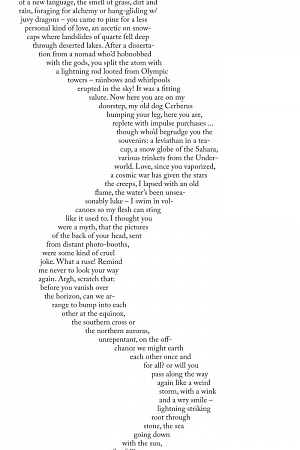Fragments
Giramondo Poets, $24 pb, 82 pp, 9781925336191
Fragments by Antigone Kefala & A House by the River by Diane Fahey
Antigone Kefala’s Fragments, her fifth book of poems and first since Absence: New and selected poems (1992), is often menaced by the past, like her first collection, The Alien (1973). Here too are some subtly demolishing portraits, as well as buoyant poems such as ‘Metro Cellist’ and the slightly brooding ‘Summer at Derveni’: ‘Afternoon heat / empty of voices / on the foil surface / heads drifting / like heavy ornaments.’ While early work transmuted the impact of her migrations from Romania to Greece to New Zealand to Australia into a pervasive sense of loss, these new poems allude to, rather than relate, such journeys that pass through languages and decades: ‘When they came back / their eyes were scorched / their hands like open wounds / the road, they said, / nothing but fire / no coolness / as they were promised / in the fables’ (‘Pilgrims’ Tales’).
As with Diane Fahey, Kefala is a keen observer of the world around her, but whereas Fahey aims for informed, yet vivid, notation of the natural world, Kefala’s descriptions are pertinently brief but sieved through discomfiting interpretation. At least two poems equate masculine power with violence: a gun like ‘a metal erection’ (‘Weapons’); ‘The killers / spoke in bullets’ (‘The Film’). Other poems are compressed psychological portraits: ‘He was lending us his presence / sure of its value. / His past, a famous story / he no longer challenged / he was wearing it now – / an ill fitting garment’ (‘Public Figure’).
Continue reading for only $10 per month. Subscribe and gain full access to Australian Book Review. Already a subscriber? Sign in. If you need assistance, feel free to contact us.
















Leave a comment
If you are an ABR subscriber, you will need to sign in to post a comment.
If you have forgotten your sign in details, or if you receive an error message when trying to submit your comment, please email your comment (and the name of the article to which it relates) to ABR Comments. We will review your comment and, subject to approval, we will post it under your name.
Please note that all comments must be approved by ABR and comply with our Terms & Conditions.